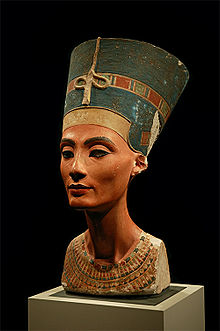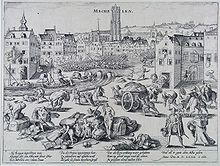- Looting
-
"Plunder" redirects here. For other uses, see Plunder (disambiguation)."Ransack" redirects here. For the Transformers character, see Ransack (Transformers).
Looting (Hindi lūṭ, akin to Sanskrit luṭhati, [he] steals; also Latin latro, latronis "thief")—also referred to as sacking, plundering, despoiling, despoliation, and pillaging—is the indiscriminate taking of goods by force as part of a military or political victory, or during a catastrophe, such as during war,[1] natural disaster,[2] or rioting.[3] The term is also used in a broader sense, to describe egregious instances of theft and embezzlement, such as the "plundering" of private or public assets by corrupt or greedy authorities.[4] Looting is loosely distinguished from scavenging by the objects taken; scavenging implies taking of essential items such as food, water, shelter, or other material needed for survival while looting implies items of luxury or not necessary for survival such as art work, precious metals or other valuables. The proceeds of all these activities can be described as loot, plunder, or pillage.
Contents
Looting by type
War looting
Main article: War lootLooting originally referred primarily to the plundering of villages and cities not only by victorious troops during warfare, but also by civilian members of the community (for example, see War and Peace,[5] which describes widespread looting by Moscow's citizens before Napoleon's troops enter the town, and looting by French troops elsewhere; also note the looting of art treasures by the Nazis during WWII[6]). Piracy is a form of looting organized by ships on the high seas outside the control of a sovereign government. The Hague Convention of 1907 and the Fourth Geneva Convention of 1949, both explicitly ban "pillage" by hostile armies. A common way to avoid this is to establish Custodian of Enemy Property, which handle the property until it can be returned.
Archaeological removals
Looting can also refer to antiquities formerly removed from countries by outsiders, such as some of the contents of Egyptian tombs which were transported to museums in Europe.[7] Other examples include the obelisks of Pharaoh Amenhotep II, in the (Oriental Museum, University of Durham, United Kingdom), Pharaoh Ptolemy IX, (Philae Obelisk, in Wimborne, Dorset, United Kingdom). Recent controversies include the major part of the architectural sculptures adorning the Parthenon, often called the "Elgin Marbles", removed by Lord Elgin, later sold to the British Museum, and claimed by Greece that they should be returned.[8]
Further information: Grave robberyLooting of industry
In the aftermath of the Second World War Soviet forces had engaged in systematic plunder of Germany, including the Recovered Territories which were to be transferred to Poland, stripping it of valuable industrial equipment, infrastructure and factories and sending them to the Soviet Union.[9][10]
Measures against looting
During a disaster, police and military authorities are sometimes unable to prevent looting when they are overwhelmed by humanitarian or combat concerns, or cannot be summoned due to damaged communications infrastructure. Especially during natural disasters, some people find themselves forced to take what is not theirs in order to survive. How to respond to this is often a dilemma for the authorities.[11] In other cases, looting may be tolerated or even encouraged by authorities for political or other reasons.
Examples of looting
By conquerors
See also: Looted art#Looting of countries The iconic bust of Nefertiti, was illegally obtained by the Germans during the customary excavations at Tell el-Amarna in 1912.[12][13]
The iconic bust of Nefertiti, was illegally obtained by the Germans during the customary excavations at Tell el-Amarna in 1912.[12][13]
- Following the death of Valentinian III in 455, the Vandals invaded and extensively looted the city of Rome.
- Mahmud of Ghazni repeatedly plundered the temple cities of Somnath, Mathura, Kannauj etc of India between 1000 A.D and 1027 A.D.
- After the siege of Constantinople in 1204, the crusaders looted the city and transferred its riches to Italy.
- Roman Catholic troops of Imperial Field Marschal Johann Tserclaes, Count of Tilly committed the Sack of Magdeburg in 1631. Magdeburg's civilian population was quickly reduced from 30,000 to 5,000, giving rise to the new term magdeburgisiren (modern spelling magdeburgisieren, "to magdeburgize") in German as a synonym for utter annihilation by means of grossest atrocities.
- In 1664 the Maratha leader Shivaji sacked and looted Surat.
- During World War II, both Nazi Germany and the Empire of Japan engaged in massive and systematic looting of valuables worth tens of billions of dollars. See:
By others
- In 1977 the New York Blackout resulted in massive rioting and looting throughout the city of New York.
- In 1989 during Operation Just Cause, the invasion of Panama, there was massive systematic looting including office towers organized by the Dignity Battalions. Manuel Noriega is called the Father of modern looting.
- In 1992, during the Rodney King riots, widespread looting occurred in Los Angeles, California.
- After the United States occupied Iraq, the absence of Iraqi police and the reluctance of the U.S. to act as a police force enabled looters to raid homes and businesses, especially in Baghdad, most notably the Iraqi National Museum. During the looting, many hospitals were stripped of nearly all supplies. However, upon investigation many of the looting claims were in fact exaggerated. Most notably the Iraqi National Museum in which many curators had stored important artifacts in the vaults of Iraq's central bank.[14]
- In 2005 in New Orleans after Hurricane Katrina there was massive looting by some people desperate for food, with police being accused of joining in in some cases. Many were in search of food and water that were not available to them through any other means, as well as non-essential items such as beer and televisions.[15]
- In 2010 after the Haiti earthquake, slow distribution of the relief aid and the large number of affected people created concerns of civil unrest, marked by looting and mob justice against suspected looters.[16][17][18][19][20]
- During the 2011 London riots, gangs of youths undertook looting in a number of areas across the capital. [21] It has been suggested that rioting may have been organised [22] but it is unclear by whom, and to what end. London was last subjected to looting by gangs of youths who took advantage of war damage during the Second World War. [23] The 2011 London looting was copied on subsequent nights in other cities around England, including Manchester, Liverpool and Birmingham.[24]
See also
References
- ^ "Baghdad protests over looting". BBC News. BBC. 2003-04-12. http://news.bbc.co.uk/2/hi/middle_east/2941733.stm. Retrieved 2010-10-22.
- ^ "World: Americas Looting frenzy in quake city". BBC Online Network. BBC. 1999-01-28. http://news.bbc.co.uk/2/hi/americas/262848.stm. Retrieved 2010-10-22.
- ^ "Argentine president resigns". BBC News. BBC. 2001-12-21. http://news.bbc.co.uk/1/hi/world/americas/1722584.stm. Retrieved 2010-10-22.
- ^ "Definition of the word loot". Dictionary.com. Dictionary.com, LLC. 2010. http://dictionary.reference.com/browse/loot.
- ^ War and Peace by graf Leo Tolstoy - Project Gutenberg
- ^ "Nazi loot claim 'compelling'". BBC News. October 2, 2002. http://news.bbc.co.uk/1/hi/entertainment/arts/2291481.stm. Retrieved May 11, 2010.
- ^ "Egypt's Antiquities Chief Combines Passion, Clout to Protect Artifacts". National Geographic News. October 24, 2006. http://news.nationalgeographic.com/news/2006/10/061024-hawass.html.
- ^ Thorpe, Vanessa (January 13, 2002). "Elgin Marbles 'should be shared' with Greece". London: The Guardian UK. http://www.guardian.co.uk/parthenon/article/0,,632019,00.html. Retrieved May 11, 2010.
- ^ "MIĘDZY MODERNIZACJĄ A MARNOTRAWSTWEM" (in Polish). Institute of National Remembrance. Archived from the original on 2005-03-21. http://web.archive.org/web/20050321165047/http://www.ipn.gov.pl/biuletyn/13/biuletyn02_2.html. See also other copy online
- ^ "ARMIA CZERWONA NA DOLNYM ŚLĄSKU" (in Polish). Institute of National Remembrance. Archived from the original on 2005-03-21. http://web.archive.org/web/20050321233124/http://www.ipn.gov.pl/biuletyn/4/biuletyn4_51.html.
- ^ "Indonesian food minister tolerates looting". BBC News. July 21, 1998. http://news.bbc.co.uk/1/hi/world/asia-pacific/136582.stm. Retrieved May 11, 2010.
- ^ German archaeologist Ludwig Borchardt (...) claimed to have an agreement with the Egyptian government that included rights to half his finds (...). But a new document suggests Borchardt intentionally misled Egyptian authorities about Nefertiti. (English) "Top 10 Plundered Artifacts - Nefertiti's Bust". www.time.com. March 5, 2009. http://www.time.com/time/specials/packages/article/0,28804,1883142_1883129_1883119,00.html. Retrieved 2009-08-27.
- ^ Will Nefertiti Return to Egypt for a Brief Visit? Egypt Asks Germany for a Majestic Loan by Stan Parchin (June 17, 2006) about.com
- ^ Iraq's Endangered Cultural Heritage: An Update
- ^ Photos : Story in Pictures-- Hurricane Katrina : Aug 31, 2005: Looting in Mississippi
- ^ "Haiti street justice: The worst in people - 'We are at a moment of disaster,' man says after mob beats suspected looter"
- ^ "Looting Flares Where Authority Breaks Down"
- ^ "Anarchy looms on streets of Port-au-Prince - 3m survivors could run riot in Haiti unless aid gets in, UN warns"
- ^ "Looters roam Port-au-Prince as earthquake death toll estimate climbs - Hunger and thirst turn to violence in Haiti as planes unable to offload aid supplies fast enough"
- ^ Sherwell, Philip; and Colin Freeman (16 January 2010). "Haiti earthquake: UN says worst disaster ever dealt with". London: Telegraph Co. uk. http://www.telegraph.co.uk/news/worldnews/centralamericaandthecaribbean/haiti/7005853/Haiti-earthquake-UN-says-worst-disaster-ever-dealt-with.html. Retrieved 17 January 2010.
- ^ [1]
- ^ http://www.guardian.co.uk/uk/2011/aug/07/trouble-enfield-organised
- ^ http://www.spartacus.schoolnet.co.uk/2WWcrime.htm
- ^ http://www.bbc.co.uk/news/uk-england-london-14460554
Sources
- Abudu, Margaret, et al., "Black Ghetto Violence: A Case Study Inquiry into the Spatial Pattern of Four Los Angeles Riot Event-Types," 44 Social Problems 483 (1997)
- Curvin, Robert and Bruce Porter, Blackout Looting (1979)
- Dynes, Russell & Enrico L. Quarantelli, "What Looting in Civil Disturbances Really Means," in Modern Criminals 177 (James F. Short, Jr. ed. 1970)
- Green, Stuart P., "Looting, Law, and Lawlessness," 81 Tulane Law Review 1129 (2007)
- Mac Ginty, "Looting in the Context of Violent Conflict: A Conceptualisation and Typology," 25 Third World Quarterly 857 (2004)
Categories:- Looting
- Hindi loanwords
Wikimedia Foundation. 2010.


